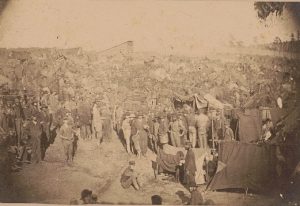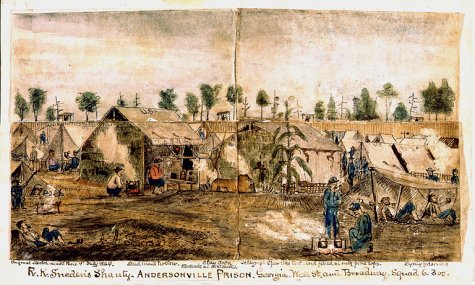July 4, 1864: “From 10,000 to 20,000 voices…singing, The Star Spangled Banner”
 Many of the Union soldiers captured at the Battle of New Market were eventually sent to the infamous Confederate stockade known as Andersonville. I’ve been reading some accounts of soldiers who were there and came across this account of Fourth of July 1864 in that prison camp. I got chills reading it – thinking about thousands of voices making a statement in song about Independence and freedom that scared and hesitated their captors.
Many of the Union soldiers captured at the Battle of New Market were eventually sent to the infamous Confederate stockade known as Andersonville. I’ve been reading some accounts of soldiers who were there and came across this account of Fourth of July 1864 in that prison camp. I got chills reading it – thinking about thousands of voices making a statement in song about Independence and freedom that scared and hesitated their captors.
Here is the account of Independence Day in Andersonville by Private Robert Knox Sneden:
Today being Independence Day several educated comrades made short speeches to small crowds of willing listeners. Our desperate condition was fully discussed and as there was no prospect of being exchanged and seeing our far off homes again we were advised to keep orderly and abide our time when Sherman’s army might reach us, as it was known that he was marching with 100,000 men through Georgia. The fearful monthly death roll was commented on and prayer meetings would be held if any would attend. The Raiders were now vanquished and would meet just and quick punishment. Some of them must die for their brutal murders and they would be tried by judge and jury composed of our men. All those Raiders yet in camp were cautioned to stop their work at once, or they would be clubbed and arrested like the others. Three rousing cheers from 200 or more prisoners were given for “The Old Flag,” while hundreds of others sang “Rally round the flag boys” and “Star Spangled Banner.” One of the sailors who was good at sewing made a small American flag from some red flannel and part of a white shirt. This was waved as the crowd sang, and cheers went up all over the northern part of the stockade. All was quiet and orderly again in a few minutes. Small crowds of twenty to fifty discussed the case of the Raiders now confined outside the north gate.

In the meantime Wirz had been had been watching the crowds and must have heard the singing and cheering [at] his headquarters at the fort. He was now in mortal fear that we would attack the guard and try to break out of the stockade. At about 9 a.m. he rode over to the depot on the gallop and sent an engine which happened to be there off at full speed for General Howell Cobb at Macon sixty miles away to come here at once. About 10 a.m. all were startled by a gun being fired from the fort on the hill and as the round shot “swished” through the air overhead a panic seized many of us, who ran for the holes in the ground dug previously. All thought that the Rebels were now going to fire grape and canister into the whole mass of 35,000 men as threatened by Wirz. But only one shot was fired. The ball went clean over the stockade into the woods beyond at the height of about fifty feet, so the Massachusetts artillerymen who came in with the Plymouth men said. This shot brought in all the outlying picket guards on the full run. They were joined by a large force from near the fort of three guns on the north side of the stockade and all went on “the double” into the rifle trenches and fort at Wirz’s headquarters. The whole Rebel forces was turned out at their camps, about 3,000, and formed lines of battle. Wirz, was thoroughly scared, but all was quiet and order among us.
Wirz went over to see General Winder whose headquarters was near the depot, and between it and Andersonville, and with an escort all the Rebel staff went to the depot where they waited an hour or so for the coming of General Cobb who commanded the 8th district of the state, with headquarters at Macon. About 11 a.m. the engine returned with Cobb on it. After a confab, General Cobb went along the lines of the Rebel troops and came down the hill toward the cook house and within 100 yards of the stockade. General Winder ordered the troops to file past General Cobb, who stood on a tree stump inspecting them, and ordered a hollow square to be formed. This was very clumsily executed for the “square” was a crooked oblong. Wirz and Generals Cobb and Winder were near its center. The sun came out red hot and the resin almost boiled out of the tree stump on which General Cobb stood.
After some delay Cobb made a speech in a husky voice to those around him in this wise: “officers and Soldiers of the Southern Confederacy: If you are surprised to see me here today, it is mine to confess a greater surprise that there should be deemed such a necessity for my presence. Can it be true that Georgians are deserting their posts in the face of a disarmed enemy? Can it be true that Georgians are refusing in safety to guard the Vandal horde within that den, whom your more valorous brothers have captured on a hundred bloody fields? Can it be true that there are Georgians here today, who are ready to turn loose upon their mothers, sisters, daughters and wives, that multitude of robbers who are panting for opportunities to burn and ravage our land as they wander back to rejoin their comrades, who are pressing us at every point?!”

Just at this part of the speech the songs form the stockade were heard. “The Star Spangled Banner,” etc., and “Long may it wave,” etc. As the chorus ended the speaker resumed. “Is there a man here who would so fail of his duty? Hear me, I announce in your hearing – and let no one be deceived by the hope of escape. The next and every other desert from this post, who is captured will be immediately tried by drum head court martial, and executed on the spot. And I announce further, that the commander of this post is fully vested with authority to carry out this order into execution.” The last of these words were almost drowned by the sounds from the stockades and General Cobb turned to captain Wirz and said “Have the prisoners stop that noise.” As Wirz was moving off, that sound grew tenfold louder than before. From 10,000 to 20,000 voices were now singing, “The Star Spangled Banner,” etc. All the Rebels turned their heads towards the stockade, even Wirz stood stock still until the chorus had ended. General Cobb shouted sternly to have the prisoners “stop that noise.”
For a minute he essayed to continued his speech until the chorus was a third time reached [and] his voice was completely drowned out by the booming tornado of sound and melody. The Rebel guard in [the] square stood still from astonishment. One of the sentries on the stockade wall was so scared that he let his musket fall inside the stockade. Cobb could say no more and General Winder ordered the troops to march to their camps, while the corpulent figure of Cobb was held down from the tree stump and he with others walked up to Wirz’s headquarters to get a drink probably. The singing was very good considering that so many thousands voices without any leader [were] doing it. Good time was kept too throughout. Poor half starved prisoners, cripples and sick fellows caught at the comrades who helped them to stand, and waving their bony hands united their hollow voices with enthusiasm in vocation. This was about noon time.
After this, when the Rebel troops were seen to go to their camps, every one quieted down. The sailors had managed to get some whiskey, and fiddle from somewhere outside and they kept up a noisy jubilee as long as the whiskey lasted. Singing and dancing until ration came in after 6 p.m. when all were hungry enough to eat some of the mule or rotten meat….
Trying to give a little perspective, here is a recording of ~7,000 people singing The Star Spangled Banner at an indoor location: